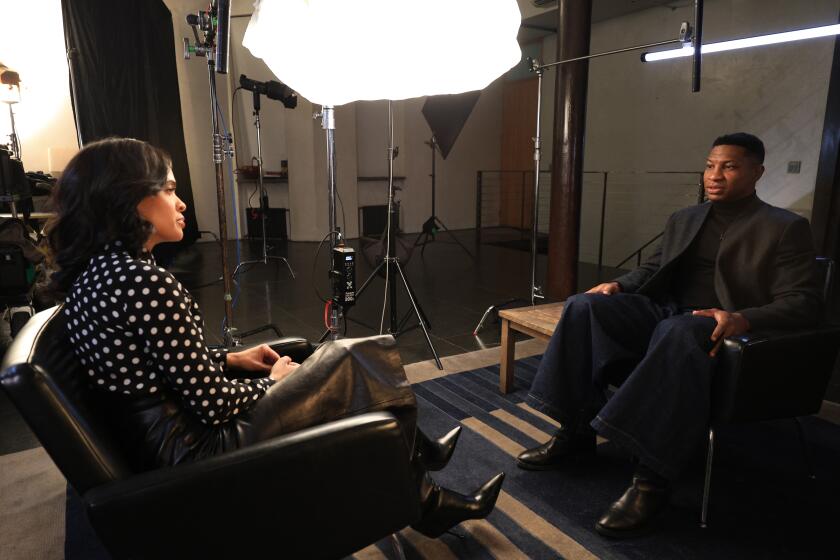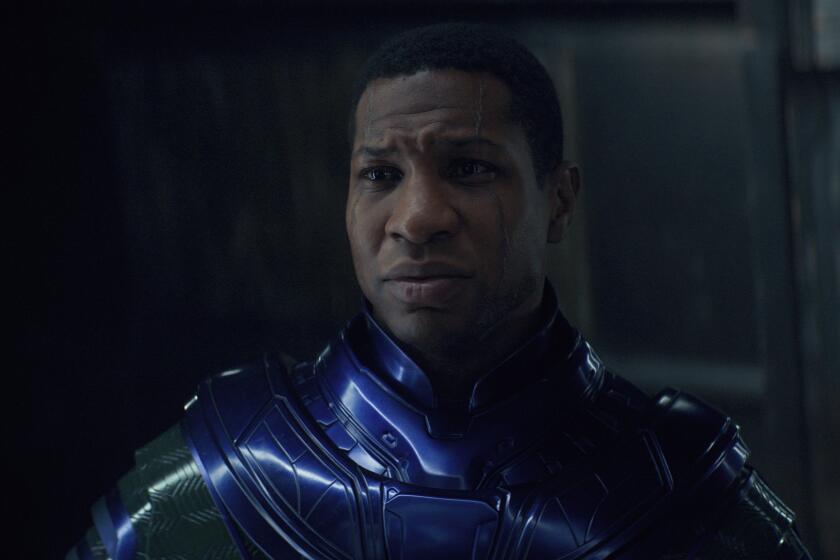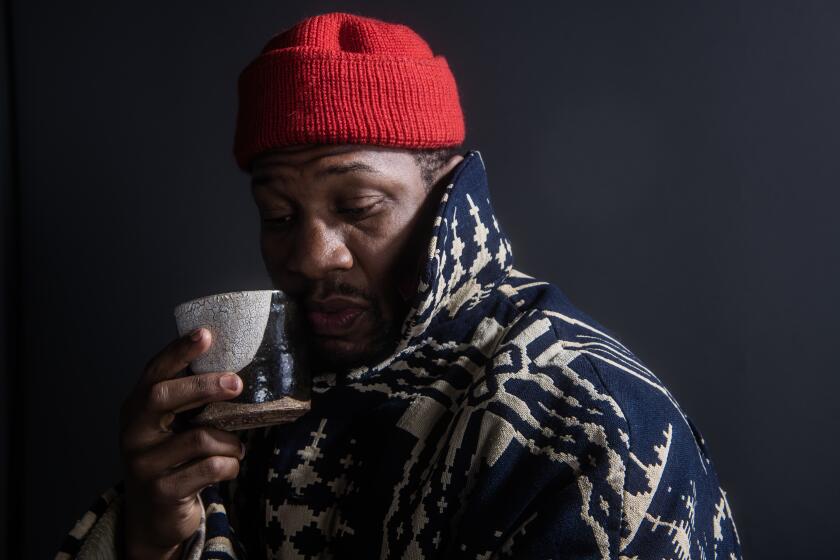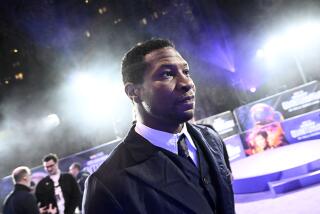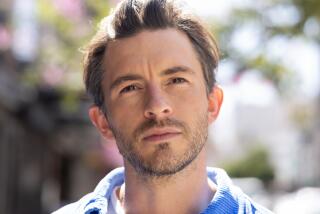Hollywood insiders on Jonathan Majors’ future: Public missteps ‘made a bad situation worse’
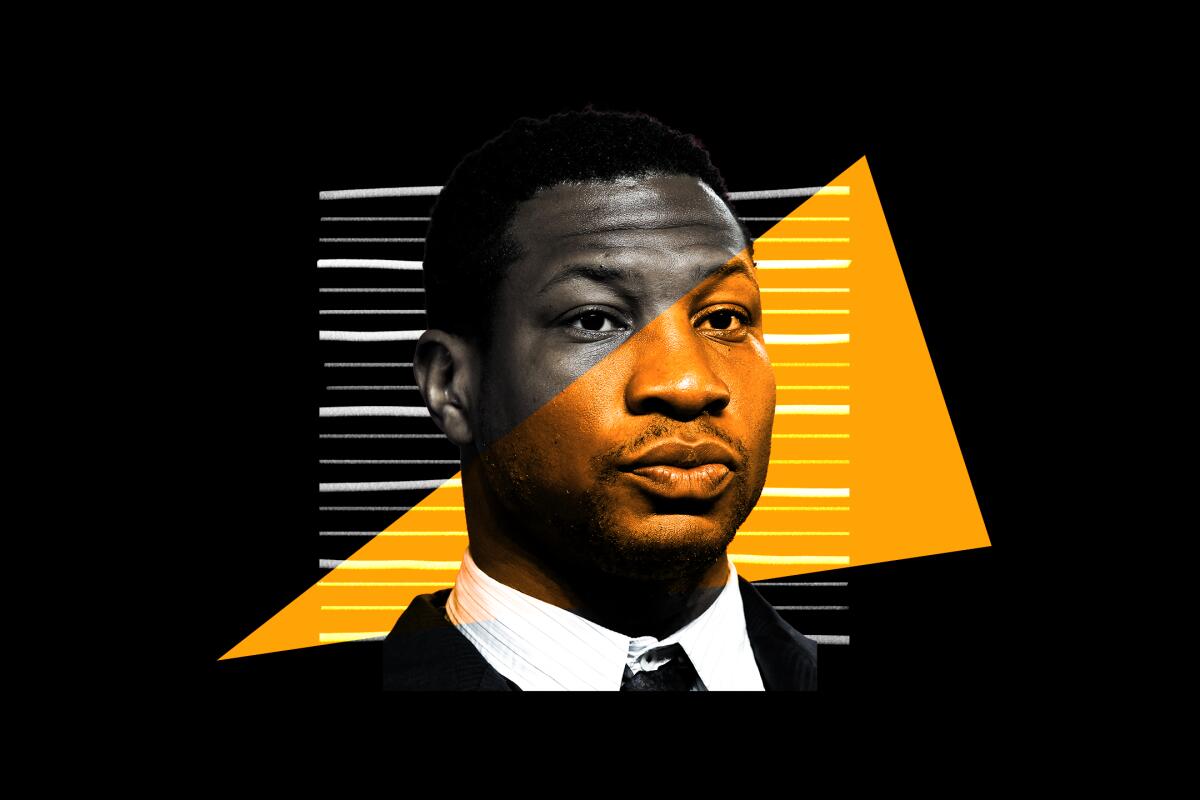
Mark Anthony Neal knew Jonathan Majors was in deep trouble.
The chair of the African and African American studies department at Duke University was stunned last March when he heard that Majors had been charged with assaulting and harassing his former girlfriend, actor Grace Jabbari.
Like legions of fans and critics impressed by Majors’ muscular performances in “The Last Black Man in San Francisco,” “Creed III,” HBO’s “Lovecraft Country” and other projects, Neal feared it was a stunning setback for a talented Black actor who seemed to be on the brink of breakthrough stardom. And, given the long history of racist tropes about Black male sexuality in America, he knew the case would be inflected by the fact that Jabbari is white.
“My immediate response was, ‘He’s done,’” Neal said in an phone interview last month. “It was a bad look, considering not only the culture at large but also thinking about how Black Americans would respond. I felt it would be difficult for him to navigate the situation.”
In the aftermath of his arrest, Majors had already suffered serious career damage, losing his management and public relations firm as well as ad campaigns with the U.S. Army and the Texas Rangers baseball team. But the fallout after a New York jury in December found him guilty on two of four counts was particularly swift and brutal. Disney fired Majors from his role as supervillain Kang the Conqueror in the Marvel Cinematic Universe. He was cut from a film about basketball star Dennis Rodman. And “Magazine Dreams,” which had sparked early Oscar buzz for Majors after it premiered at the 2023 Sundance Film Festival, is in limbo after being dropped by distributor Searchlight Pictures.
Still, as Majors faces sentencing in the case, which was postponed on Tuesday because of motions filed by his legal team, Neal and others say it’s the actor’s post-conviction behavior that has hurt him most, casting doubts on his ability to repair his reputation once his legal troubles are behind him.
Those missteps — along with his decision to stay in what he has described as an “unhealthy” relationship while his career was on the upswing — have clouded optimism among his admirers that Major might regain at least some of his former traction in Hollywood.
In his first interview since being convicted of assaulting and harassing then-girlfriend Grace Jabbari, Majors, joined by new girlfriend Meagan Good, said he deserves a second chance.
“Jonathan made a bad situation worse — one PR failure after another,” said Nathan Miller, founder and CEO of Miller Ink, a Los Angeles-based strategic communications and crisis management firm.
Andrew Bourke, director of communications at ChaudhryLaw PLLC, declined The Times’ request for comment from Majors’ attorney, Priya Chaudhry.
Many critics of Majors cite an ABC News interview in January in which the actor, who did not take the stand during his trial, awkwardly maintained his innocence while declaring he was the true victim. He has been slammed for his shaky demeanor and evasive responses. When asked about how Jabbari’s injuries, which were photographed by police, came about, Majors said, “I wish to God I knew.”
“That interview tremendously undercut his credibility,” said Miller. “There’s ways of denying you committed physical assault but also acknowledging the complexities of the situation that shows responsibility. The public doesn’t like it when they think someone is being evasive and makes themselves a victim.”
The interview also included an audio clip played in court in which Majors described himself as a “great man” while accusing Jabbari of not living up to the standards set by spouses of famous Black men, such as Coretta Scott King and Michelle Obama.
“When he gets on TV and essentially compares himself to a Martin Luther King who needs a Coretta, it suggests just how out of touch he is with what is happening to him at this moment,” Neal said.
Veteran entertainment manager and publicist Ramon Hervey II added, “That interview was a really bad mistake. It was irrelevant because he was already convicted. It was also ill-timed — it was not going to change the public perception of him at a time he really needed to be away from the media and await his sentencing.”
Present during the interview was Majors’ current girlfriend, actor Meagan Good, who stars in the Amazon comedy “Harlem” and was at Majors’ side during court proceedings. Speculation swirled around the couple, with some observers suggesting the relationship was a setup to boost support for Majors among Black fans.
“This is such a farce,” declared Natasha Scott-Reichel during a segment of the “2 Black Girls, 1 Rose” pop culture podcast, which she hosts with best friend Justine Kay. “Why are you trying to get us in the Black community to root for you? Nobody is rooting for you, bro.”
Added Neal: “There was clearly a team of fixers trying to get him past this situation with the Black community. He seems to be a Black actor who was not particularly interested in Black women.”
A representative for Good did not respond to The Times’ request for comment.
Jonathan Majors was expected to play a key role in the MCU as villain Kang the Conqueror. Now that Marvel has cut ties with the actor, we look at what it means for the franchise’s future.
Despite the backlash, Majors continues to put up a positive front. Confronted by a TMZ reporter on the street last week and asked how he was holding up, Majors smiled and said, “God is good, God is great,” adding that he is bolstered by prayer and faith.
Majors and Jabbari clashed during a March 24 car ride after she read a romantic text message sent to his phone by another woman. Prosecutors alleged that Majors grabbed Jabbari’s hand so hard he fractured her middle finger, and also struck her face with an open hand and pushed her into a vehicle.
Although Majors could receive up to a year in prison at his sentencing for recklessly assaulting Jabbari in the third degree and harassing in the second degree, experts predict that he is unlikely to find himself behind bars, especially because he has no prior criminal convictions.
The court of public opinion may be less forgiving.
“If his people thought they could create a shift in his public image, they miscalculated,” Hervey said, citing the ABC News interview. “They created another situation where he could be judged, prosecuted and assessed. He didn’t deliver what he intended.”
Kay of the “2 Black Girls, 1 Rose” podcast said Majors’ comments about Coretta Scott King and Michelle Obama were offensive and alienating to the Black community — sorely disappointing given her previous admiration for Majors.
“I was such a huge fan in a way that I thought, ‘He’s supposed to be my husband,’” Kay quipped in a phone interview. “I thought he was such a great actor. I saw him in ‘Ant-Man and the Wasp: Quantumania’ where he played Kang, and he really stood out in a very bad movie.”
She continued: “A lot of the reason Jonathan was uplifted the way that he was is that so many Black women were supporters of him. So using Black women in a historical context as a prop is not going to work out well for him.”
Race may also be a factor in whether Majors can mount a comeback and what shape it may take.
Hollywood insiders say Majors is likely to face more hurdles than Mel Gibson, who for several years was considered damaged goods in the industry after he was recorded making antisemitic remarks during a 2006 arrest for driving under the influence in Malibu. The Oscar winner also pleaded no contest in 2011 to a charge of misdemeanor spousal battery, among other reputation-damaging controversies.
After keeping a lower profile for years, however, Gibson, with support from top stars like Robert Downey Jr. and Jodie Foster, has mounted a comeback, receiving an Oscar nomination for directing “Hacksaw Ridge” in 2017 and directing Mark Wahlberg and Michelle Dockery in an upcoming thriller, “Flight Risk.” Gibson also played a prominent role in last year’s “John Wick” TV spinoff, “The Continental,” and is said to be working on a sequel to his controversial 2004 blockbuster “The Passion of the Christ.”
News Analysis: What Jonathan Majors’ dramatic rise and fall says about race and justice in Hollywood
The actor, who this week faces his first court date in a domestic dispute, may suffer more career damage than his Hollywood counterparts do. Is race a factor?
Majors’ trajectory could end up more closely mirroring that of Nate Parker, a Black actor and director. Parker’s career was on the rise after his 2016 film, “The Birth of a Nation,” which he wrote, directed and starred in, won top prizes at the Sundance Film Festival. But he soon was caught up in scandal when a story resurfaced that he and his co-story writer, Penn State roommate Jean McGianni Celestin, had been charged in 1999 with raping a freshman at the university who alleged that she was intoxicated and unconscious at the time. Both men claimed that the encounter was consensual.
Parker was acquitted in 2001 after testimony that he had previously had consensual sex with the woman. Celestin was initially convicted of sexual assault, but that verdict was overturned in 2005 when he was granted a mistrial on grounds that his counsel was ineffective. The case was dropped a year later when prosecutors could not gather enough witnesses to testify in a retrial. The woman died by suicide in 2012.
Despite directing and appearing in 2019’s “American Skin,” Parker’s career never recovered.
With Majors’ sentence expected to be light, observers say, there’s a path for the actor to resuscitate his reputation, even in the absence of public support from his past celebrity collaborators.
“Jonathan is only 34 — this is not the nail in his coffin,” Hervey said. “If he gets off with a hand slap, he needs to get away from public life. If I were involved, I would have him silenced for quite a while and pay personal penance.”
But Miller warned that the actor will have to deal with a reality check.
“People in Hollywood have come back from worse, but I warn folks in this situation that they are not going to be able to go back from where they started from,” he said. “The question is whether Jonathan has the insight to speak honestly about what happened and take some responsibility. There has to be a willingness to transmit to the public that you’ve learned and grown.”
More to Read
The biggest entertainment stories
Get our big stories about Hollywood, film, television, music, arts, culture and more right in your inbox as soon as they publish.
You may occasionally receive promotional content from the Los Angeles Times.
